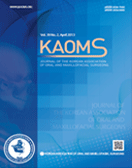Journal of the Korean Association of Oral and Maxillofacial Surgeons
- P-ISSN2234-7550
- E-ISSN2234-5930
- SCOPUS, KCI, ESCI
 ISSN : 2234-7550
ISSN : 2234-7550
Associations between obstructive sleep apnea and painful temporomandibular disorder: a systematic review
Jeong Keun Lee (Institute of Oral Health Science, Ajou University School of Medicine, Suwon, Korea)
Abstract
The relationship between obstructive sleep apnea (OSA) and diverse types of pain conditions have been proposed. However, no consensus on the rela-tionship between OSA and painful temporomandibular disorders (TMDs) has been established. Therefore, this systematic review has been conducted to review the existing literatures and provide comprehensive synthesis of such literatures about OSA and painful TMDs using the evidence-based methodology. A literature search was conducted using two electronic databases, Scopus, and PubMed. Risk of bias was assessed using the risk-of-bias assessment tool for non-randomized study version 2.0. A total of 158 articles were screened from the initial search and eventually, 5 articles were included in this systematic review. One study adopted both the longitudinal prospective cohort and case-control designs and other 4 articles adopted the cross-sectional design. Two studies employed polysomnography (PSG) for the diagnosis of OSA and mentioned the results from the PSG. All cross-sectional studies demonstrated higher OSA prevalence among patients with TMD, and one cohort study suggested OSA as a risk factor for TMD. OSA appears to have potential influences on the development of TMD; however, the role of TMD in the development of OSA remains to be unknown ow-ing to the lack of high-quality evidences.
- keywords
- Obstructive sleep apnea, Temporomandibular disorder, Pain, Inflammation, Sleep fragmentation
- 다운로드 수
- 조회수
- 0KCI 피인용수
- 0WOS 피인용수